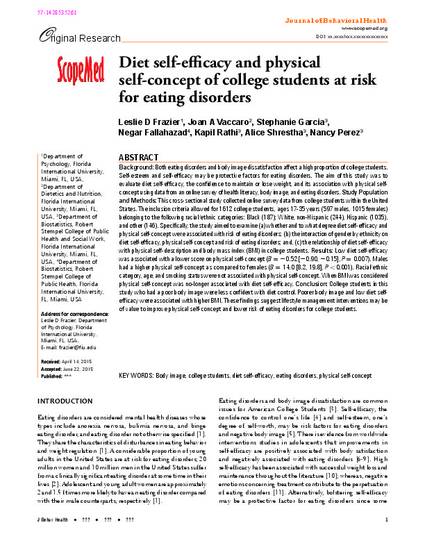
Background: Both eating disorders and body image dissatisfaction affect a high proportion of college students. Self-esteem and self-efficacy may be protective factors for eating disorders. The aim of this study was to evaluate diet self-efficacy, the confidence to maintain or lose weight, and its association with physical selfconcept using data from an online survey of health literacy, body image, and eating disorders.
Study Population and Methods: This cross-sectional study collected online survey data from college students within the United States. The inclusion criteria allowed for 1612 college students, ages 17-35 years (597 males, 1015 females) belonging to the following racial/ethnic categories: Black (187); White, non-Hispanic (244), Hispanic (1035), and other (146). Specifically, the study aimed to examine (a) whether and to what degree diet self-efficacy and physical self-concept were associated with risk of eating disorders; (b) the interaction of gender by ethnicity on diet self-efficacy, physical self-concept and risk of eating disorders; and, (c) the relationship of diet self-efficacy with physical self-description and body mass index (BMI) in college students.
Results:Low diet self-efficacy was associated with a lower score on physical self-concept (B = −0.52 [−0.90, −0.15], P = 0.007). Males had a higher physical self-concept as compared to females (B = 14.0 [8.2, 19.8], P
Conclusion: College students in this study who had a poor body image were less confident with diet control. Poorer body image and low diet selfefficacy were associated with higher BMI. These findings suggest lifestyle management interventions may be of value to improve physical self-concept and lower risk of eating disorders for college students.
Available at: http://works.bepress.com/joan_vaccaro/35/
